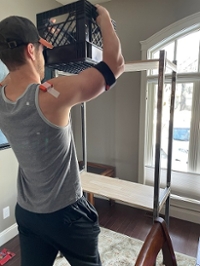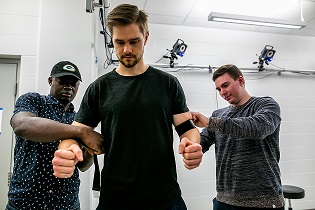Shoulder function measurement for everyone: validating wearable sensors for in-field research
Study Description

Upper limb and shoulder movement patterns and postures are related to the development of body pain and injury. However, measuring shoulder movement (‘kinematics’) is challenging and often limited to studies of restricted movements in laboratory settings. The emergence of wearable sensors called inertial measurement units (IMUs) presents a possible solution to these challenges, but more research is needed to validate their use for the shoulder outside of the research lab.
The purpose of the project is to determine if IMUs can accurately measure shoulder kinematics when used in-field to assess functional tasks.
This University of Saskatchewan College of Medicine-funded study will be used to generate data for validation. The IMUs will be used to measure kinematics in-field, specifically in three unique settings: work (rural Saskatchewan farms), sport (Gordie Howe Sports Complex), and activities of daily living (participant homes).
Findings will identify and guide troubleshooting processes and confirm the utility of IMUs for in-field shoulder motion measurement. This work is a necessary step that will inform proceeding projects, such as in-depth ergonomic analyses of postural demands in rural farm work in Saskatchewan, which will in turn guide return-to-work interventions for farmers. Future research will apply these findings to wide-ranging occupations and clinical groups throughout Canada.

Investigators
